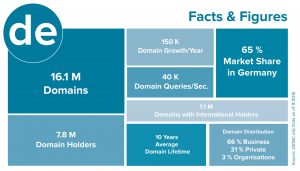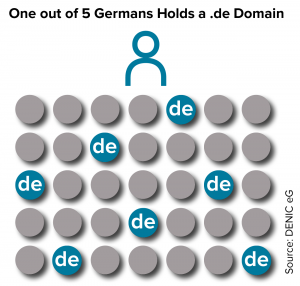Germans are active on social networks everyday with millions of e-mails and tweets being posted, a significant amount of this is due to the domain ending in the German country code .de this is without the mention of countless websites people visit in Germany everyday while the .de registrations are lately slowing down. .de started on a small-scale 5 November 30 years ago and now is a part of a global medium that is indispensable for us all in our daily routines. That comes up with innovations every day. One major factor in the Germans economy’s growth is the internet sector as no industry is not dependent on the digital infrastructure.
Table of Contents
From a Playground for Tinkerers To a Global Playing Field
30 Years ago, text message services, job, car and real estate marketplaces, travel and rating portals, crowdfunding and streaming platforms, online shopping, banking, petitions and campaigns, search engines, virtual forums, encyclopaedias and universities would not be present on the internet but today it’s the norm with the internet being present in these fields making many things easier and more convenient while being comfortable. With the digital world business and economic processes are getting interlinked with billions of networked objects gaining ground fast.
From communicating to searches to online transactions about 84% of the German speaking population are online today with 65% using the internet daily of two hours’ average and 57% on mobile devices with a trend rising with 87% of German enterprises that have less than 10 employees own a website. With roughly 20% of non-food turnover in the German retail sector generated online.
Domains – Signposts on the Internet and Digital Identity
Behind many offers is a .de domain at work acting as signposts on the internet, domains are a fundamental part of an e-mail address that make websites and other services easily accessible to other humans without need to keep in mind endless sequences of numbers the same say computers communicate.

Unlike the social networks, with your own personal domain users have the ability to design their website to fit their designs according to their ideas. In addition they maintain full sovereignty of their personal data, with a domain standing at the core of an individualised web presence and integrates from complementary web offers such as social media profiles.
A digital identity that enterprises or private individuals create with a .de domain is an average of 14 characters long, The operation of technical services related to a German domain resides with DENIC Eg who having been providing their services for 20 years and are not for profit with their cooperative base in Frankfurt am Main, Today it has a membership count of over 320 companies in the ICT sector that promotes the preservation of open, free, secure internet on the international stage.
Number 3 in the World – Facts and Figures about .de
With a inventory of over 16.1 million domains .de is the second most popular in the world right after China (19.5 million) among all country codes used on the internet. Referred to all ending that exist (Top Level Domains) .de is among the top three following .com (127.3 million) and .cn.
Due to DENIC’s liberal terms and conditions it allows anybody to register a domain, .de domains at an early stage are used by not only businesses but developed into a option among private users who require the ability to build a “homepage”. Due to this the growth of .de was very dynamic, in only three years the domain surged from 20,000 in 1996 to over one million in 1999 with further rises made registrations to 5 million by 2001 and to a staggering 10 million by 2006.
As a result, growth of .de was very dynamic: In only three years, between 1996 and 1999, domain numbers surged from 20,000 to one million, as of now .de gains roughly 150,000 new domains each year.
Statistically every 5th German inhabitant owns a unique .de domain with every three being registered for private individuals with an average of two thirds being for enterprises and 3%^ for organisations such as authorities, clubs and associations, the overall domain holders amount to roughly 7.8 million with these all using one of several domains for their digital card not only for websites but for personalised e-mail addresses.

With a high technical stability and resilience have made the German internet extension a highly regarded brand that is know over the world, with the German internet community not only owns .de by a large share of over 65% in domestic markets thus leaving other extensions like .com (20%) far behind in Germany, with roughly ten years of an average .de domain the holders have loyalty.
High standard in security
Many studies have been conducted in the internet industry by groups such as Anti-Phishing Working Group give German Top Level Domains good rating with very little .de domains being used for criminal activities, not only resulting in a great relevance for search engines but also underpins the high standards met by the German TLD when it comes to security on the internet.
Due to the high security and a wide reach with low prices render .de domains inviting to domain holders from outside of Germany. 7% or 1.1 million domains that use .de are registered abroad with holders coming in from over 217 different country’s many located in USA and the Netherlands.
The vast popularity of Germany offers if reflected by traffic rates as DENIC’s has to manage on a 247/365 basis at over 40,000 times per second, with over a billion a day with over 300 users checking if a domain is free adding up to 26 million user consults DENIC’s whois information service per day.
